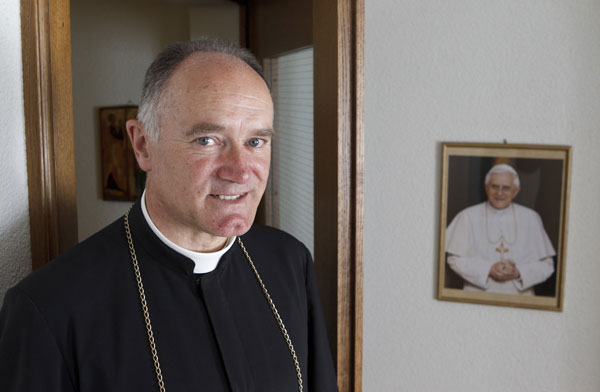
MENZINGEN, Switzerland (CNS) — The leader of a breakaway group of traditionalist Catholics spoke in unusually hopeful terms about a possible reconciliation with Rome, but acknowledged significant internal resistance to such a move, which he said might lead to the group splitting apart.
Bishop Bernard Fellay, superior general of the Society of St. Pius X, spoke to Catholic News Service May 11 at the society’s headquarters in Switzerland about the latest events in more than two years of efforts at reconciliation with the Vatican.
The society effectively broke with Rome in 1988, when its founder, the late Archbishop Marcel Lefebvre, ordained four bishops without the permission of Blessed John Paul II in a protest against modernizing changes that followed the Second Vatican Council of 1962-65.
In April the society responded to a “doctrinal preamble” stipulating the group’s assent to certain church teachings, presumably including elements of the teaching of Vatican II, as a prerequisite for reconciliation. The Vatican has yet to respond, but the director of the Vatican press office initially described the latest position as a “step forward.”
The society is hardly united behind its leader’s position, however. In April, according to a letter which surfaced on the Internet May 10, the society’s other three bishops warned Bishop Fellay that the Vatican’s apparent offer to establish the group as a personal prelature — a status currently held only by Opus Dei — constituted a “trap,” and urged him to say no.
“There are some discrepancies in the society,” Bishop Fellay told CNS. “I cannot exclude that there might be a split.”
But the bishop defended his generally favorable stance toward the Vatican’s offer against the objections of his peers.
“I think that the move of the Holy Father — because it really comes from him — is genuine. There doesn’t seem to be any trap,” he said. “So we have to look into it very closely and if possible move ahead.”
He cautioned, however, that the two sides still have not arrived at an agreement, and that unspecified guarantees from the Vatican are still pending. He said the guarantees are related to the society’s traditional liturgical practices and teachings, among other areas.
“The thing is not yet done,” the bishop said. “We need some reasonable understanding that the proposed structure and conditions are workable. We are not going to do suicide there, that’s very clear.”
Bishop Fellay insisted the impetus for a resolution comes from Pope Benedict XVI.
“Personally, I would have wished to wait for some more time to see things clearer,” he said, “but once again it really appears that the Holy Father wants it to happen now.”
Bishop Fellay spoke appreciatively of what he characterized as the pope’s efforts to correct “progressive” deviations from Catholic teaching and tradition since Vatican II. “Very, very delicately — he tries not to break things — but tries also to put in some important corrections,” the bishop said.
Although he stopped short of endorsing Pope Benedict’s interpretation of Vatican II as essentially in continuity with the church’s tradition — a position which many in the society have vocally disputed — Bishop Fellay spoke about the idea in strikingly sympathetic terms.
“I would hope so,” he said, when asked if Vatican II itself belongs to Catholic tradition.
“The pope says that … the council must be put within the great tradition of the church, must be understood in accordance with it. These are statements we fully agree with, totally, absolutely,” the bishop said. “The problem might be in the application, that is: is what happens really in coherence or in harmony with tradition?”
Insisting that “we don’t want to be aggressive, we don’t want to be provocative,” Bishop Fellay said the Society of St. Pius X has served as a “sign of contradiction” during a period of increasing progressive influence in the church. He also allowed for the possibility that the group would continue to play such a role even after reconciliation with Rome.
“People welcome us now, people will, and others won’t,” he said. “If we see some discrepancies within the society, definitely there are also (divisions) in the Catholic Church.”
“But we are not alone” in working to “defend the faith,” the bishop said. “It’s the pope himself who does it; that’s his job. And if we are called to help the Holy Father in that, so be it.”
— By Francis X. Rocca, Catholic News Service





